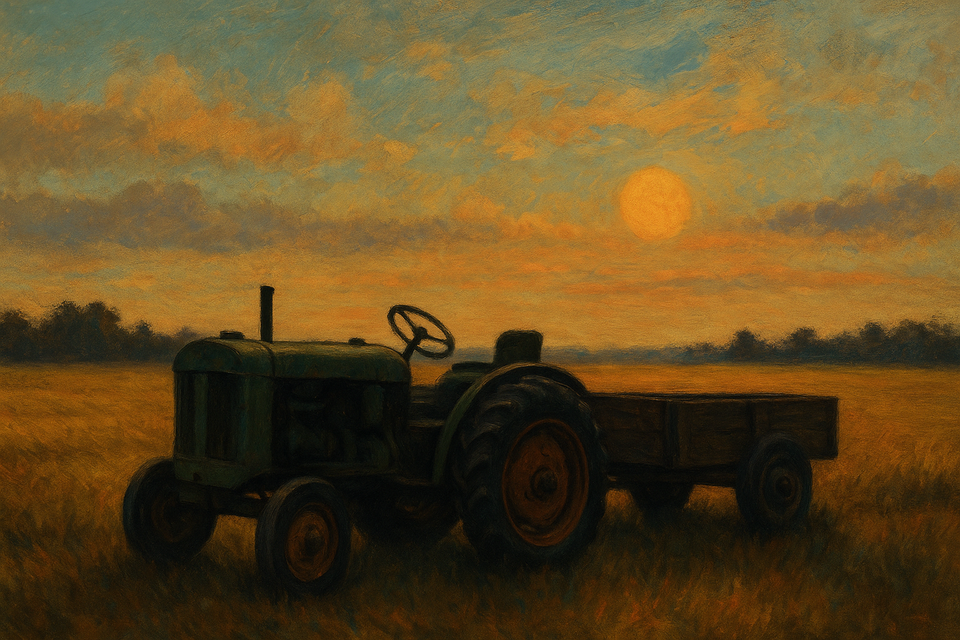The Straight Story (1999): Persistence Beneath the Stars

Ordinary Fields, Extraordinary Journey
David Lynch’s The Straight Story (1999) begins not in the realms of nightmare or dream that so often shape his cinema, but in the ordinary fields of the Midwest. A tractor moves across an open plain, the rhythms of harvest taking the place of industrial howls and electric shadows. The images are plainspoken, even modest — a main street emptied of bustle, a woman sunbathing in her yard, a sudden fall inside the house next door. Alvin Straight has collapsed. He resists help, resists the doctor, lights a cigar anyway. Lynch lingers, not to unsettle but to notice, to set the register of a story that finds drama in the unadorned texture of small-town life.
The news of his brother’s stroke cuts through Alvin’s stubborn routines with unusual clarity. For a man who shrugs off doctors and smokes in defiance of frailty, the thought of Lyle laid low is unbearable. The brothers have not spoken in a decade, their silence calcified into a kind of living loss, but Alvin refuses to let the separation be final. “Rose, darling, I’m not dead yet,” he tells his daughter, a line pitched somewhere between defiance and plea. With little money, failing eyesight, and a body that can no longer drive a car, he improvises a plan as implausible as it is resolute: to cross Iowa and into Wisconsin on a lawnmower towing a small trailer. What sounds absurd becomes, in his voice and bearing, an act of moral necessity.
Faces That Carry the Story
The film’s endurance also rests on performances pitched with restraint. Richard Farnsworth, in his final role, carries Alvin with a dignity that never tips into saintliness — each smile edged with pain, each line spoken with the weight of someone measuring his breath. Sissy Spacek brings Rose a tremulous gentleness, her halting speech and quiet devotion turning what could have been a stock “dependent daughter” role into something luminous. Harry Dean Stanton appears only at the end as Lyle, but his brief presence deepens the reunion; the emotion in his face as he takes in Alvin’s improbable arrival is more powerful than dialogue could ever be. Together, they ground the fable in human texture, reminding us that persistence, however mythic, is lived out in fragile bodies and voices.
Roadside Parables and the Weight of Memory
Alvin’s first effort is almost doomed from the start. His old mower sputters and stalls, coughing its way down the highway until a passing truck blows his hat off and strands him roadside. Before long he is towed back into town, his dream looking ridiculous against the scale of the road ahead. The old men at the bar shake their heads, muttering that he’ll never make it past the grotto. Alvin answers their doubt not with words but with a shotgun — putting a final end to the machine that betrayed him. Then, undeterred, he scrapes together money for another mower, this one a John Deere thirty years old but still serviceable. It is not a grand purchase, but it feels like a recommitment; he is not giving up, only trading one fragile vessel for another.
Once the John Deere carries him past the grotto, Alvin settles into the long crawl of the journey. Along the way he meets a young hitchhiker, frightened and pregnant, who shares his campfire for a night. Alvin listens, and in turn speaks of Rose — the daughter whose life has been filled with struggles herself. He offers a simple parable, binding sticks into a bundle to show how family, held together, is unbreakable. By morning the girl has gone, but she leaves behind her own bundle of sticks, a quiet signal that his story may have reached her. Later he shelters in a barn as rain lashes outside, then watches with quiet wonder as a bicycle race surges past — youth and speed streaming by in contrast to his crawl. When the riders cheer him on at their next pause, the moment feels like grace, a recognition that persistence can be honored in any form.
Not all encounters are gentle. A woman breaks down after hitting her thirteenth deer in as many weeks, grief and futility spilling into the road. Alvin offers no grand comfort, only presence. On a downhill stretch his mower itself nearly betrays him, sliding out of control until neighbors rush to help. Behind them a controlled burn consumes a house, fire carefully tended while his machine goes wild. He stays the night in their yard, fragile but unbroken, before one of the men leads him into town. There, over beer and silence, Alvin shares a heavier burden with another veteran. What begins as small talk drifts into memories of war — the distance he has kept from the bottle, the shadows that return unbidden. Lynch threads faint echoes of battle under their words, as if the past still hummed through the present. It is the film’s most haunting stretch, revealing that the road Alvin travels is not only toward his brother but through the battlefield of memory itself.
When Alvin finally reaches the Mississippi, the journey takes on a different gravity. The river marks a threshold, less a geographic crossing than a symbolic one: he is no longer simply on the road but drawing near to the heart of what summoned him. In a small town nearby he meets a priest who knows his brother. Their conversation is gentler, less confessional than the talk with the veteran, but it unearths a different kind of wound. Alvin speaks of childhood, of the long silence that has severed him and Lyle, of nights spent looking at the stars together. The priest listens, and in the telling the film’s quiet fascination with the sky — those recurring shots of Alvin gazing upward — comes into focus.
Even as the destination draws close, the mower itself begins to fail. The John Deere sputters and stalls just shy of Lyle’s home, as though the machine had finally carried him as far as it could. Alvin sits stranded, the silence heavy, until a larger tractor passes and the old engine stirs once more. The moment is small, but it plays like grace — a last test of endurance answered by persistence, the road itself conceding that he may finish what he began.
At last Alvin rattles up to the shanty where his brother lives. The mower putters to a stop, and the silence between the two men, unbroken for ten years, suddenly feels fragile enough to split. Lyle steps out, sees the contraption that carried Alvin across hundreds of miles, and his composure falters. There are no speeches, no reckonings drawn out in words — only the sight of two old men, weathered by time and regret, sitting side by side. When Alvin looks upward and Lyle follows his gaze, the film closes not on reconciliation spoken but on the stars overhead, a shared memory reclaimed in silence.
Americana, Endurance, and Performance
Seen against the rest of Lynch’s work, The Straight Story feels almost anomalous: a G-rated film, free of grotesque violence or surreal horror, content to move at the speed of a lawnmower across the Midwest. Yet the gentleness is not a departure so much as another side of the same vision. Lynch has always been preoccupied with what lies beneath ordinary surfaces, whether menace or dream. Here the hidden current is not terror but persistence — the slow, stubborn push of a man who refuses to yield to age, distance, or despair.
The Midwest Alvin traverses is not dressed up as postcard nostalgia, nor flattened into cliché. Lynch gives us long shots of harvested fields, rain clouds sweeping low, a roadside barn creaking under storm. These images breathe, sometimes stretching longer than narrative convention would demand, until they become less backdrop than atmosphere. In this patience, the land itself feels like a character — beautiful and unforgiving, ordinary yet carrying the charge of myth.
Alvin himself becomes a kind of emblem for age carried with dignity but not without cost. His body is unreliable — hips failing, eyes dim, balance precarious — yet his will cuts sharper than any of his infirmities. What could seem like mere stubbornness plays here as philosophy: to keep moving, however slowly, is to claim a measure of control against decline. In that light, the lawnmower crawl becomes less eccentric than profound, a form of pilgrimage. The film’s quietest moments — Alvin watching a storm with Rose, sharing a fire with another veteran, or simply staring up at the stars — all fold into that same image of endurance.
Along the way, Alvin’s encounters accumulate into something like a liturgy of ordinary grace. The hitchhiker who leaves behind a bundle of sticks, the cyclists who cheer his crawl, the farmer who shelters him after the runaway mower — each exchange is modest, but together they form a pattern of recognition. These people do not transform Alvin, nor he them, in grand narrative fashion. Instead they acknowledge one another’s burdens, and for a moment share the road. In this sense the journey becomes communal, even sacramental: small rituals of food, story, and presence strung like beads across the miles.
Flaws, Risks, and the Quiet Radicalism of Reconciliation
If there are flaws in The Straight Story, they lie less in execution than in the risks of its chosen mode. The pacing is unhurried to the point of testing patience; for some, the long fields and slow machinery may feel like stasis rather than revelation. The sentiment, too, skirts a fine line. Alvin’s parable of the bundle of sticks, or the closing upward gaze at the stars, risks leaning into the overly neat if taken without the weight of context. Yet Lynch’s discipline largely rescues these moments, grounding them in lived detail and unshowy performance. The greater risk may be that the film feels almost too gentle, its quietness easy to overlook in a cinema culture that rewards spectacle. But what seems fragile proves durable — the very slowness that could lose us is the condition for its grace.
In the end, the film leaves us with two old men beneath the night sky, their silence finally broken not by words but by presence. The stars they once watched as boys return as a bridge after years of estrangement, a reminder that reconciliation need not be eloquent to be real. What began with tractors in the fields closes with constellations overhead, the everyday and the eternal held in the same frame. Lynch has made stranger, louder, more unsettling films, but perhaps none so quietly radical as this — a story that insists persistence itself can be luminous. On balance, The Straight Story is a triumph: tender, unsentimental, and deeply moving. Strongly recommended; four and a half stars.



Comments ()